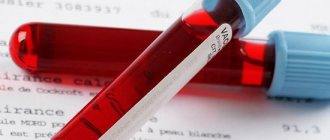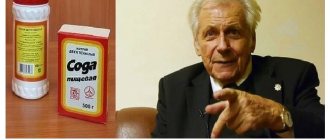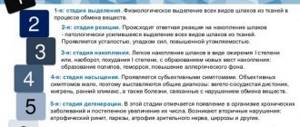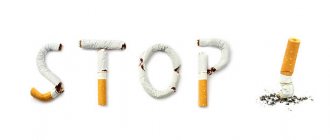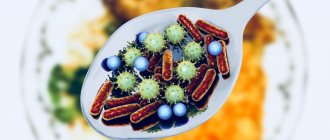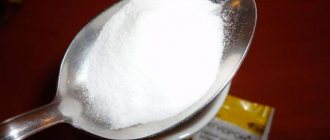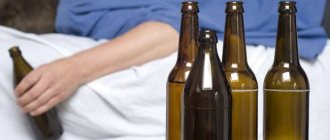Intoxication of the body can occur for many reasons. Her treatment is carried out in a hospital setting or at home. In this article, we looked at how to relieve intoxication at home, what medications can be used before the doctor arrives, and in what situations it is necessary to hospitalize the patient in the hospital.
Symptoms of poisoning
Food poisoning is a disease with an acute onset, manifested by a detailed clinical picture with a predominance of dyspeptic syndrome. The causes of the disorder may be: mayonnaise, dairy products, cakes, pastries, sausages, eggs, pates. Typical symptoms are:
- The first manifestations of the pathological condition begin after 30 minutes or after 4-6 hours.
- The patient has diarrhea (loose stools, unpleasant odor, with undigested food residues).
- Before or after diarrhea, nausea and repeated vomiting appear.
- Severe abdominal pain, increased salivation.
- Additional signs include dizziness, low-grade or high body temperature, chills, and general weakness.
Algorithm of action for food poisoning
It is advisable for every person to know how to detoxify the body at home. Feasts and overeating with fatty foods are constant companions for food lovers. A simple algorithm of actions will help you protect yourself from serious complications and quickly cure acute poisoning:
- Removing toxic foods from the body is the main condition for successful treatment. Gastric lavage will help get rid of food. The first method: drink a large amount of water and try to induce a gag reflex by mechanically irritating the root of the tongue. Doctors recommend using a weak solution of potassium permanganate instead of ordinary water (better effect + additional disinfection). For 2 liters of boiled water, take a small amount of potassium permanganate powder or a spoonful of soda. Drink some of the solution in small sips. Insert two fingers into your mouth and trigger the gag reflex. The procedure must be repeated several times so that the vomit becomes clean, without pathological impurities (it is advisable to completely empty the stomach so that the medicine can be administered).
- The next step to get rid of food toxins is sorbents. The drugs neutralize toxic substances, bacteria, and their waste products. Activated carbon is an invariable home assistant in crisis situations. It prevents the absorption of heavy metal salts and toxins in the gastrointestinal tract. Treatment of activated carbon poisoning increases the patient’s chances of a quick recovery and improvement in general condition. The correct and effective dosage is 10 kg per 1 kg of weight. A 60 kg woman needs to take 6 sorbent tablets. White coal and its effectiveness. The dose of this medication is halved compared to activated carbon (3-4 tablets are recommended for adults). Take 1 tablet of the drug per 100 ml of water, crush it and drink. The taste of the medicine leaves much to be desired, but it is worth enduring. The mixture quickly removes the unpleasant symptoms of food poisoning. “Smecta”, “Lactofiltrum”, “Enterosgel”, “Polysorb” show good results.
- Food poisoning does not occur without diarrhea and profuse vomiting, which significantly dehydrates the body. Treatment is to replenish fluid loss and maintain water balance. To defeat pathology, you need to drink about 2 liters of liquid. Take small sips, a few tablespoons every 15 minutes. Experts recommend adding salt to the water to replenish the supply of electrolytes (for 1 liter, 1 teaspoon of salt). Alternate unsweetened tea with saline solution. The pharmacy sells similar drugs for rehydration - “Regidron”, “Oralit”. They are presented as powders, solutions with mineral salts, and glucose. Medicines prevent severe dehydration and its adverse effects.
How to return to normal life?
When the main course of therapy is completed and the sick leave is closed, the person quite often continues to experience loss of appetite and weakness. There may be slight increases in temperature in the evening - these are the so-called temperature “tails”.
How to restore strength and alleviate the condition? The following recommendations may be taken into account:
- A course of multivitamins or simply a complete diet, balanced with all the main components of the daily menu: carbohydrates, fats and proteins, is useful. The diet must include the required amount of fruits and vegetables - sources of vitamins .
- During the fight against infection, the liver experiences a very high load. You can complete a course of restorative treatment with hepatoprotectors for a month. This group of herbal products reduces the effects of intoxication.
Fighting intoxication of the body, which causes deterioration in well-being and many unpleasant symptoms, correctly chosen antiviral therapy is the key to successful treatment and prevention of severe consequences, most dangerous for weak patients and children.
Treatment methods
To completely get rid of food intoxication, you need to eliminate the cause. In case of carbon monoxide poisoning, the person is taken out into fresh air. For gastric pathology, the situation is similar - getting rid of low-quality products. At home they resort to the methods described above, and in the hospital they put in IVs. When a victim is hospitalized in a hospital, the doctor decides on how to take fluids: oral or intravenous. The first is prescribed for moderate severity of the disease, the second for the patient’s severe condition.
The following medications are used for parenteral administration:
- A dropper with regular saline solution, glucose, potassium chloride and magnesium sulfate. Take twice as much glucose as a 0.9% NaCl solution.
- A 40% glucose solution is taken orally. This helps to increase urine production and, as a result, eliminate toxins.
- Hemodez-N is a detoxifying agent with minerals. A dropper with the drug is placed twice a day until the symptoms of the disease improve. The dosage of the drug depends on the age of the patient. 400 ml of detoxification solution is administered to an adult, and 50-200 ml to a child.
- Reamberin is a similar drug containing all the necessary electrolytes that have been lost (K, Mg, Ca, Na). The medication binds bacterial toxins and removes them from the body. Additionally, Reamberin increases oxygen access to tissues and organs. 200 ml dripped twice a day.
- The name of the next drug speaks for itself - Gelatinol, that is, it contains gelatin. The medicine normalizes blood pressure, carbohydrate and protein metabolic processes. It is used to activate the liver and kidneys (especially in sepsis).
- Reopoliglucin makes the patient feel better by improving blood flow in the capillaries and increasing plasma volume.
- Diuretics will help cleanse the blood of toxins absorbed from the intestines. Mannitol and furosemide trigger a cascade of reactions in the renal nephrons: the more fluid, the more active the kidneys work.
- An important element of poisoning therapy is dietary nutrition. On the first day you should adhere to bed rest and refuse to eat (cold-hunger principle, rest). When the symptoms are relieved, the body can take food, eat crackers without additives, diet cereals, muesli, drink dried fruit compote, not very concentrated tea. The diet should not continue even after discharge from the department.
- As at the pre-medical level, sorbents continue to be taken in hospital settings.
- If your body temperature is high (more than 38.5 degrees), you need to take antipyretics (Paracetamol, Ibuprofen). Monitor body temperature regularly, especially in children.
- “Pancreatin”, “Mezim” are enzymatic preparations to maintain pancreatic function. They are prescribed when vomiting stops completely.
- Antibiotics are used to treat a bacterial infection.
What not to do if poisoned
- It is forbidden to relieve abdominal pain with painkillers, so as not to blur the clinical picture of other diseases (acute appendicitis, pancreatitis, cholecystitis, intestinal obstruction).
- Do not allow the body to become dehydrated. Try to drink more water.
- It is forbidden to eat fatty foods after treatment; the situation can easily repeat itself. It is better to stay on a gentle diet for a month.
- Pregnancy and childhood are clear medical indications for hospitalization. Children and pregnant women with symptoms of food poisoning should not be left at home. For expectant mothers, toxicosis may indicate a serious pathology that requires consultation with a competent specialist. Call an ambulance immediately. Untimely treatment may lead to the department of anesthesiology and intensive care.
For expectant mothers
Toxicosis in expectant mothers is very similar to the phenomenon described above; it occurs due to changes associated with pregnancy. The emergence of a new life entails a restructuring of all systems, changes in hormonal levels, etc. For health, this does not go unnoticed.
If a woman is poisoned during pregnancy, the remedies intended for most people are not suitable for her. Without fear, you can only take activated carbon, and also drink a lot. It is best to seek medical help as soon as possible, because in this case the fetus is also negatively affected.
How to relieve vomiting and acute intoxication without drugs
He ate something and vomited once - one situation, a completely different situation - severe dehydration, which ends in intensive care. Traditional recipes will help relieve symptoms of mild intoxication. Homeopathy and regular rehydration will help a poisoned person. The following herbs and fruits are used:
- decoctions of viburnum, rose hips, black currants;
- If you have an aloe flower in your house, try its medicinal properties. Grind 200 g of plant leaves to make a paste. Add a few spoons of honey. Leave the composition for a day. Take a tablespoon before meals;
- make an infusion of tansy. Pour 50 g of flowers into a liter of water, boil the mixture, use instead of tea;
- a solution of calendula and chamomile relieves inflammatory and toxic processes in the stomach and intestines. Take 1 tbsp. l per glass of boiled water.
Poisoning with acids and alkalis scares people, but no one takes stomach problems due to poor quality food seriously. Both situations require medical attention and timely treatment. Food, chemical, and drug poisoning require rapid detection and treatment.
Spoiled, low-quality food products cause great harm to human health. Untimely and improper treatment of the pathology leads to dehydration of the body.
In the life of every person, situations arose when, for example, as a result of consuming a low-quality product, a state of intoxication occurred. Intoxication refers to the presence of toxins in the body and the resulting disruptions in the functioning of systems. Harmful substances can come from the outside world or form inside. Depending on the number of harmful agents, different levels of intoxication are released. Everyone needs to know how to detoxify the body in order to be able to help themselves or another person.
Prevention
Considering that intoxication can be caused by numerous toxins, their prevention is multifaceted. It includes the following main activities:
- promptly identify and treat infectious and somatic diseases;
- eat only high-quality food products that have not expired;
- drink only high-quality drinking water;
- store medications out of the reach of children with mandatory labeling of each drug indicating the name, dosage, and expiration date;
- do not eat unknown plants and mushrooms;
- when going into nature, wear clothes that provide maximum protection from possible bites from poisonous insects and snakes;
- carefully follow the rules and safety requirements when working with toxic substances.
Causes of intoxication
Why is the body exposed to harmful substances? How to avoid such a situation? Among the reasons why the body finds itself in a state of intoxication are the following:
Advice from the chief parasitologist.
Pinworms, Giardia, tapeworm, helminths, tapeworm. The list goes on for a long time, but how long are you going to tolerate parasites in your body? But parasites are the main cause of most diseases, from skin problems to cancer. But the head of the Institute of Parasitology of the Russian Federation, German Shaevich Gandelman, assures that it is easy to cleanse your body even at home, you just need to drink.
- bites of poisonous animals, contact with poisonous plants;
- interaction with chemical components;
- inflammatory processes in the body;
- metabolic disorders;
- production of toxic substances by the body itself;
- poisoning with low-quality products;
- alcohol poisoning;
- poisoning by waste products of parasites;
- drug poisoning.
The ways in which hazardous components enter the human body are as follows:
- digestive tract;
- respiratory system;
- skin;
- mucous membranes.
The clinic directly depends on the type and amount of the irritant that enters the body. An important role is played by the state of health and the routes of penetration of toxins.
Diagnostics
Diagnosis of intoxication is not difficult; it can be much more difficult to determine the type of toxin that caused disruption of body functions. For this purpose, they resort to laboratory tests aimed at detecting the toxin itself or its metabolic products in the biological fluids of the body.
The cause of endogenous intoxication is the formation of toxic products caused by extensive tissue damage.
A biochemical blood test is carried out, the results of which make it possible to identify changes in the functions of systems and organs associated with exposure to toxic substances.
Signs of body poisoning
Poisoning can be of two types:
An acute condition occurs with a single contact with a harmful substance, a chronic condition is characterized by frequent contact with a foreign agent. In any course of intoxication, the following manifestations are distinguished, occurring in a complex or as single symptoms:
- headache;
- muscle pain;
- hyperthermia;
- nausea or vomiting, both symptoms are possible at the same time;
- painful sensations in the abdomen;
- diarrhea;
- tachycardia;
- weakness, sweating;
- drop in blood pressure;
- disturbance of consciousness;
- fainting conditions;
- convulsions.
The listed manifestations are characteristic of acute poisoning. Chronic intake of toxins is characterized by headaches, weakness, irritability, sleep disturbances and depression. A state of chronic fatigue develops, immunity decreases, and allergic reactions of various types appear. You can add the following typical symptoms of chronic poisoning:
- constant nervousness;
- unpleasant odor from the human body;
- external signs of aging of the body - dull hair, flabby dry skin.
The clinical picture depends on the substance that caused the poisoning. Symptoms of intoxication may appear within an hour from the moment of contact with a harmful substance or after a while. Human life in such situations depends on timely assistance. Some cases require immediate hospitalization, and attempts to provide assistance at home can cost the patient's life. It is strictly unacceptable to self-medicate in the following cases:
- mushroom poisoning;
- alcohol poisoning;
- canned food poisoning;
- early childhood - children under three years of age are hospitalized immediately;
- pregnancy at any stage;
- elderly age;
- people with chronic diseases;
- unconscious patients.
Relieving symptoms of drug intoxication
Drug intoxication is drug poisoning. This is one of the most common reasons. Young children sometimes mistake the colorful pills for tasty candy and eat them. Adults violate the dosage or self-medicate, and all this becomes the cause of drug poisoning. If intoxication occurs, it is advisable to take two groups of drugs:
The first group includes the following drugs:
Taking rehydrants helps restore water-salt balance and stop dehydration:
The use of probiotics helps restore damaged intestinal microflora:
It is not recommended to take the medicine on your own; you should consult a doctor.
Medicines incompatible with alcohol
What drugs are not recommended for use for alcohol poisoning:
- Furosemide diuretic tablets have a strong side effect on the kidneys and liver during intoxication;
- sleeping pills increase disorders of the central nervous system;
- acetylsalicylic acid (aspirin) helps during a hangover, but do not take after drinking alcohol;
- visiting a bathhouse is not recommended to get rid of a hangover. The exception is people with excellent health.
Removing alcohol intoxication
Alcohol poisoning comes second after drug intoxication. As a result of excessive accumulation of ethanol in the human body, the patient’s mental state changes and the functioning of internal organs is disrupted. Among the main symptoms are:
- severe headache;
- nausea, vomiting;
- dizziness, inability to move or even lie down;
- thirst.
Intoxication occurs not only as a result of excessive alcohol consumption. The reason may be the adoption of a surrogate - low quality alcohol. This condition requires hospitalization. At home, before doctors arrive, it is recommended to give plenty of fluids and try to induce vomiting.
Stages and methods of detoxification at home
If the patient does not belong to a risk group and is not in serious condition, you can try to relieve intoxication at home. Sometimes not everyone knows how to relieve intoxication and how to help the patient. Stages of treatment that reduce the manifestations of poisoning are as follows:
- gastric lavage;
- enema;
- taking medications;
- drinking plenty of water;
- dietary restrictions;
- peace.
It is advisable to begin gastric lavage at the first signs of poisoning. This will help prevent toxins from being absorbed into the blood and spreading throughout the body.
To provoke vomiting, you need to drink a large amount of salted water or still mineral water. This reduces the manifestation of intoxication. It is strictly forbidden to rinse the stomach with a concentrated solution of potassium permanganate. This can cause a burn to the mucous membrane.
Gastric lavage is contraindicated in young children, pregnant women and people with cardiovascular diseases. An enema during intoxication will help cleanse the intestines and speed up the evacuation of feces and toxins. The procedure helps reduce intoxication. You should be careful in the following patient conditions:
- intestinal obstruction;
- "acute stomach";
- hyperthermia;
- pregnancy;
- bleeding and anal fissures.
Recovery of the body after drinking alcohol lasts for a certain period. The length of the recovery period is influenced by many factors, such as the amount of alcohol consumed and health status.
Productive removal of ethyl alcohol breakdown products occurs using official and alternative methods. Their use must be approved by a narcologist. Ethanol poisoning causes the development of pathological changes.
There is no safe dose of alcohol; regular consumption of even small doses of alcohol will lead to a weakened immune system, liver damage and other serious complications.
Degrees of intoxication
There are several stages of ethyl alcohol poisoning, including:
- Alcohol toxicosis of the first degree. The proportion of ethanol in the blood is no more than 2%. In this case, the body can independently cope with the consequences that are provoked by the abuse of alcoholic beverages. A person remains sober as long as the liver produces enough of the enzyme that breaks down ethanol molecules into water and carbon dioxide. Mild alcohol intoxication can give impetus to the development of mental disorders.
- Second degree intoxication. The body contains from 2 to 3% ethyl alcohol. Signs of intoxication at this stage include impaired motor function, daytime drowsiness, severe headache, and a feeling of exhaustion. These symptoms usually occur in the morning after a feast. This condition is often called a hangover.
- The third stage of alcohol poisoning. Up to 5% ethanol can be detected in the blood. Alcohol intoxication can cause coma and death.
It is possible to relieve the symptoms of alcohol toxicosis at home, but it still wouldn’t hurt to get help from a doctor. Some manipulations are only allowed to be performed by him; these include placing an IV or administering an injection.
Precautions before drinking alcohol
In order not to end up in a state of alcohol intoxication and not to go through all the torments of hell that are known to people suffering from alcoholism, you need to clearly know your limits when drinking alcohol. Then you won’t have to remove the results of ethanol poisoning. It is worth remembering that the following simple measures will help you stay sober:
- Before the feast, you can take an aspirin tablet an hour before the feast, which will work to bind and neutralize acetallegide in the body. The feeling of a hangover the next morning will be less pronounced if you drink a large amount of alcohol. You can also take aspirin immediately after a meal. This will reduce withdrawal symptoms in the morning.
- During the feast, try to skip at least one toast. If you can’t dodge, then you don’t have to drink the whole glass. Simply taking a sip is enough to create the appearance.
- To avoid treatment for poisoning, try to eat well during the holiday. High-quality food slows down the absorption of alcohol, which means that the body will not work for wear, receiving high doses of ethanol.
Take care of yourself and your loved ones.
Symptoms of poisoning
How to get rid of alcohol intoxication at home?
The method of relieving clinical manifestations depends on their nature. At the first stage, they need to be recognized. Signs of toxicosis caused by excessive consumption of alcoholic beverages are similar to the symptoms of food poisoning.
Taking conventional medications does not bring relief, and the patient’s condition worsens due to increased nausea and the appearance of:
- Severe headache.
- Problems with urination and bowel movements.
- Dry mouth.
- Thirst.
- Dehydration.
- Dizziness.
- Mental abnormalities.
- Trembling of the limbs.
- Convulsive syndrome.
Alcohol affects people differently. This is explained by the individual characteristics of the body. At the third stage, cyanosis of the skin, arrhythmia, hypothermia (a sharp decrease in body temperature), and respiratory failure may appear.
If these symptoms occur, you should urgently call an ambulance. Otherwise, the patient may fall into a coma or die.
Restoring bowel function
The destructive effect of alcohol on the intestines manifests itself in the form of constipation and diarrhea. These are symptoms of intestinal dysbiosis.
What to do?
Introduce fermented milk products into your diet. To replenish the intestines with beneficial microflora, take probiotics.
First aid
Alcohol poisoning is fraught with the development of pathological changes. You can get rid of the consequences of a violent feast through intramuscular injection of B vitamins, glucose solution, ascorbic acid, nicotinamide.
This procedure can only be carried out by a person with appropriate experience and knowledge.
At home, assistance to the victim is provided in the following sequence:
- Provide access to fresh air.
- Place the patient on the right side.
- They bring him to his senses.
- Induce artificial vomiting. This relieves the symptoms of poisoning, regardless of the reason for which it occurred.
- Rinse the stomach (1 tablespoon of baking soda per liter of cooled boiled water).
- Apply a cold compress to the forehead.
- Give the victim a laxative and enterosorbent.
Drug therapy
Medicines should be used only after consultation with a doctor.
The same applies to infusion solutions for setting up IVs. Intensive therapy is often carried out in hospital settings. The victim’s body is cleansed of toxins through the infusion of vitamins B1 and B6. The standard course of treatment consists of three consecutive sessions.
You can take pills at home. They not only cleanse the body of ethyl alcohol breakdown products, but also restore the functioning of damaged internal organs.
Medicines must be taken until the end of the prescribed course. The fact that it has become easier does not ensure recovery. Even after mild intoxication, the body experiences stress for two days.
Maintenance treatment for alcoholism is the key to restoring vital organs.
To eliminate intoxication symptoms, the following is usually prescribed:
- Enterosgel, Lignosorb, Karbolen, Enterosorb are adsorbents.
- Anti-E, Proproten-100 – homeopathic medicines.
- Glucose, repolarizing solution - injection preparations.
- Zorex, Alka-Seltzer, Biotredin are specific medications against alcohol poisoning.
Detoxification treatment will help improve the patient’s condition at home. Its purpose is to neutralize substances that poison the body. This is achieved in three stages. The first removes toxins and waste accumulated during heavy drinking.
In the second, metabolic metabolism accelerates. This process is stimulated by restoring the functionality of the gastrointestinal tract, central nervous system, cardiovascular, circulatory and excretory systems.
The third is characterized by the neutralization of poison, in particular, acetaldehyde and carbon monoxide. Many pathological changes are irreversible, but if you give up alcohol and follow all the recommendations of a narcologist, the work of the affected cells can be compensated.
Unfortunately, detoxification therapy cannot be carried out at home.
The procedure requires full medical supervision and careful selection of medications. After carrying out these manipulations, the patient’s condition will improve significantly. Vomiting will stop, irritation will disappear, and your emotional state will stabilize. The sobering effect will occur after 30-60 minutes (depending on the degree of intoxication).
There are several rules to consider when taking medications:
- Enterosorbents are taken separately from other medications. Otherwise, their effectiveness is significantly reduced. Harmful substances are excreted along with feces.
- Treatment should be accompanied by fluid intake. Strong tea, jelly, infusions, medicinal herbs, natural (preferably freshly squeezed) juices, still mineral water, rehydrating composition (1 liter of warm boiled water, 50 g of sugar, 7 g of salt, 5 g of baking soda), distilled water - you can choose any option. The main thing is to prevent dehydration.
- Taking medications to cleanse the body should be combined with the use of drugs that normalize intestinal microflora.
These include Linex, Bifidumbacterin, Bifiform, Lactobacterin. Through them we get rid of pathogens that are localized on the mucous membranes of the gastrointestinal tract. You can speed up recovery with the help of fermented milk products.
The effectiveness of therapy directly depends on the activity of the gastrointestinal tract. A prerequisite for cleansing the body is regular bowel movements. As a last resort, you need to use an enema.
Alternative medicine
Folk remedies are often used in the treatment of poisoning caused by alcohol.
How to relieve symptoms of intoxication at home?
There are many alternative methods that can help a person who has taken an excessive amount of alcohol, among them regular use:
- Decoctions prepared from rose hips, hawthorn berries, and chamomile flowers. The ingredients are taken in the following proportion: 400 ml of boiling water requires 2 tablespoons of a natural component.
- Green tea with lemon and honey. This drink is characterized by a good diuretic effect.
- Infusions made from strawberries, beans or cranberries. These components are natural antioxidants.
- Honey water. It's not difficult to prepare. A few teaspoons of honey are dissolved in a small amount of warm boiled water.
- Diuretic compounds. Thyme, horsetail, parsley, mint and linden have similar properties.
- Egg whites. They are taken raw.
- Saffron tinctures. This is how you should get rid of vomiting and problems with the gastrointestinal tract. A natural preparation is created from one dessert spoon of ground herb. This mixture must be poured with two glasses of boiling water.
These recipes will be useful if a person has been poisoned by a surrogate and now feels sick or vomits without stopping. Thus, you can only remove the symptoms; the main treatment is carried out through medications.
What to do if using these methods it is not possible to treat a person from the consequences of alcoholism and himself?
First you need to conduct a re-examination. This is necessary to confirm a previously identified diagnosis. Afterwards you will have to reconsider the entire treatment complex.
You can finally overcome addiction only by completely abstaining from alcoholic beverages.
Possible consequences of poisoning
If acute alcohol intoxication is not stopped, the poisoned person may suffer from:
- Pathological changes in the central nervous system.
- Chronic diseases of the cardiovascular system.
- Blood pressure surges.
- Exacerbations of kidney diseases.
- Blood flow disorders in the brain.
- Weakening the body's immune defense.
- Diabetic type coma (occurs in patients with diabetes).
At home you can deal with mild to moderate intoxication. If the latter type occurs, it is advisable to call a doctor.
Timely assistance will help save a person who has been poisoned by alcohol. A patient who is constantly vomiting (third degree of intoxication) is better off going to the hospital. There, the symptoms of illness are relieved with the help of effective medications that are not widely available.
Children
Manifestations in children are the same as in adults. The danger is that in a child the same dose of harmful substances that would go unnoticed for an adult will cause severe poisoning.
If the baby does not yet speak and cannot communicate that he is feeling unwell, parents should pay attention to the following: the baby develops diarrhea, the child becomes capricious, weak, he loses weight, blood pressure decreases, and the pulse becomes rapid.
Home remedies will not help here. It is necessary to contact a medical facility as soon as possible. In addition, other diseases may also have such symptoms.
